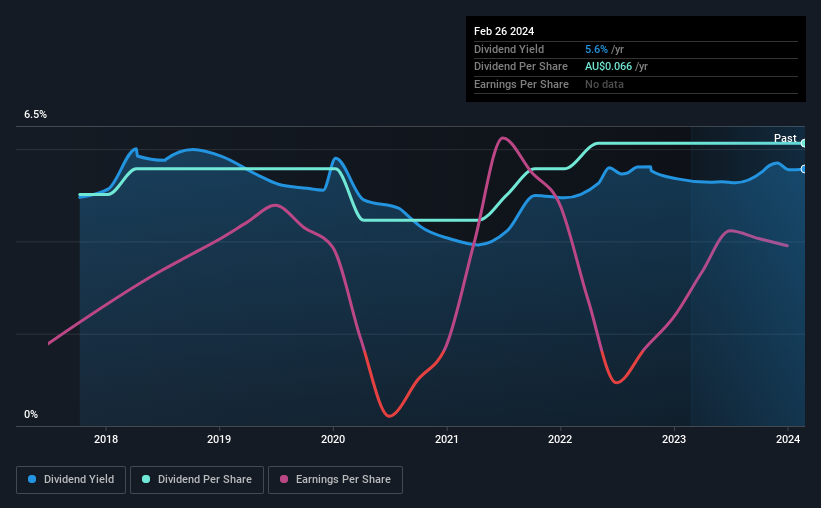Plato Income Maximiser's (ASX:PL8) Dividend Will Be A$0.0055
Plato Income Maximiser Limited's (ASX:PL8) investors are due to receive a payment of A$0.0055 per share on 28th of March. The dividend yield will be 5.6% based on this payment which is still above the industry average.
See our latest analysis for Plato Income Maximiser
Plato Income Maximiser Is Paying Out More Than It Is Earning
A big dividend yield for a few years doesn't mean much if it can't be sustained. Prior to this announcement, Plato Income Maximiser's dividend was making up a very large proportion of earnings and perhaps more concerning was that it was 135% of cash flows. Paying out such a high proportion of cash flows certainly exposes the company to cutting the dividend if cash flows were to reduce.
If the company can't turn things around, EPS could fall by 4.3% over the next year. Assuming the dividend continues along recent trends, we believe the payout ratio could reach 101%, which could put the dividend under pressure if earnings don't start to improve.
Plato Income Maximiser's Dividend Has Lacked Consistency
Even in its relatively short history, the company has reduced the dividend at least once. This makes us cautious about the consistency of the dividend over a full economic cycle. The dividend has gone from an annual total of A$0.054 in 2018 to the most recent total annual payment of A$0.066. This means that it has been growing its distributions at 3.4% per annum over that time. The dividend has seen some fluctuations in the past, so even though the dividend was raised this year, we should remember that it has been cut in the past.
The Dividend's Growth Prospects Are Limited
With a relatively unstable dividend, it's even more important to evaluate if earnings per share is growing, which could point to a growing dividend in the future. Plato Income Maximiser has seen earnings per share falling at 4.3% per year over the last five years. Declining earnings will inevitably lead to the company paying a lower dividend in line with lower profits.
An additional note is that the company has been raising capital by issuing stock equal to 18% of shares outstanding in the last 12 months. Trying to grow the dividend when issuing new shares reminds us of the ancient Greek tale of Sisyphus - perpetually pushing a boulder uphill. Companies that consistently issue new shares are often suboptimal from a dividend perspective.
The Dividend Could Prove To Be Unreliable
In summary, while it's good to see that the dividend hasn't been cut, we are a bit cautious about Plato Income Maximiser's payments, as there could be some issues with sustaining them into the future. The payments are bit high to be considered sustainable, and the track record isn't the best. This company is not in the top tier of income providing stocks.
Investors generally tend to favour companies with a consistent, stable dividend policy as opposed to those operating an irregular one. However, there are other things to consider for investors when analysing stock performance. Just as an example, we've come across 4 warning signs for Plato Income Maximiser you should be aware of, and 1 of them shouldn't be ignored. Looking for more high-yielding dividend ideas? Try our collection of strong dividend payers.
Have feedback on this article? Concerned about the content? Get in touch with us directly. Alternatively, email editorial-team (at) simplywallst.com.
This article by Simply Wall St is general in nature. We provide commentary based on historical data and analyst forecasts only using an unbiased methodology and our articles are not intended to be financial advice. It does not constitute a recommendation to buy or sell any stock, and does not take account of your objectives, or your financial situation. We aim to bring you long-term focused analysis driven by fundamental data. Note that our analysis may not factor in the latest price-sensitive company announcements or qualitative material. Simply Wall St has no position in any stocks mentioned.

